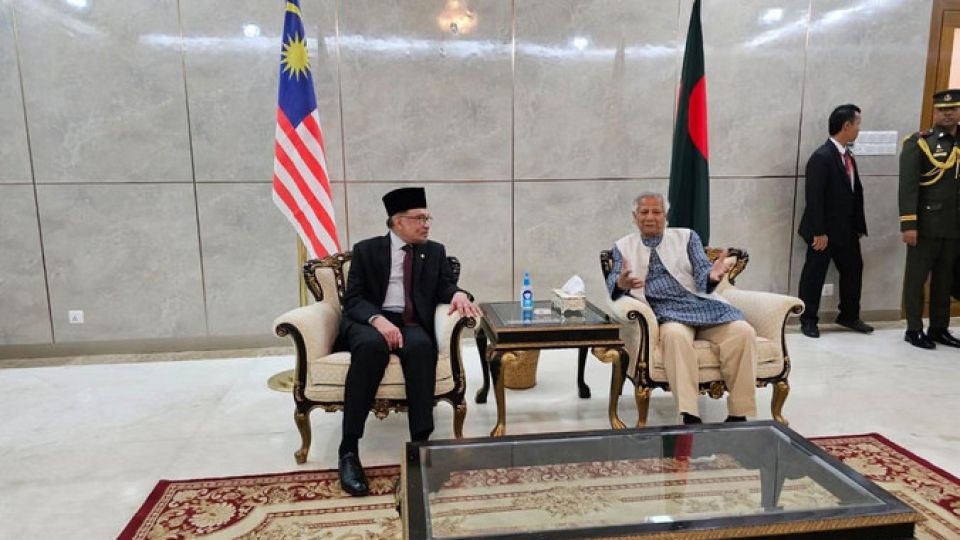October 7, 2024
DHAKA – Malaysian Prime Minister Anwar Ibrahim’s visit to Bangladesh has created an opportunity to restructure the labour recruitment process that has long been mired in corruption and exploitation, analysts said.
They added that Anwar Ibrahim’s Madani vision and Chief Adviser Nobel Laureate Prof Muhammad Yunus’s track record of working for the marginalised people converge quite well.
Malaysia Madani is a policy framework and government slogan introduced by the administration led by the 10th Prime Minister, Anwar Ibrahim. It focuses mainly on good governance, sustainable development and racial harmony in the country.
The fact that these two leaders are “great friends”, as was evidenced by Anwar Ibrahim being the first foreign head of government visiting Dhaka and supporting Prof Yunus, can play a critical role in initiating pragmatic ways to solve problems, the analysts said.
CR Abrar, executive director of the refugee and migratory movement research unit and former professor of international relations at Dhaka University, said the people are at the core of any state relationship and, in the case of Bangladesh and Malaysia, the first priority for Dhaka is the rights of some 800,000 Bangladeshis working in Malaysia.
He added that he is optimistic about this as the two leaders spoke positively. “Now, the words need to be translated into action.”
Of the 800,000 Bangladeshis in Malaysia, 450,000 migrated there between August 2022 and May 2024. The problem, however, was a lack of transparency and the involvement of vested quarters close to both the governments when the MoU was signed in 2021.
Malaysia had the discretion in selecting the Bangladeshi recruitment agencies, and the criteria for selecting the 101 agencies were not known.
Studies found that the recruitment cost for each migrant was between US $4,500 and $6,000 and that many fraud companies got Malaysia’s approval for hiring Bangladeshi workers.
The Malaysian authorities managed the recruitment process through the web-based Foreign Workers Centralised Management System (FWCMS) — a tool for manipulation – operated by controversial company Bestinet.
According to migrant rights activists, between 100,000 to 200,000 Bangladeshis remain jobless or underpaid there and at least 96 percent of them face risks of exploitation due to recruitment debt, said the US-based non-profit Verite in a study.
The Socialist Party of Malaysia’s Migrant Desk Coordinator Mohana Rani Rasiah said the condition of the Bangladeshi migrants, especially those who went there since August 2022, is “horrible”.
“A lot of these workers don’t have jobs. Their rights to proper accommodation, food and decent work are being violated,” she told this correspondent over phone from Kuala Lumpur yesterday.
Anwar Ibrahim and Prof Yunus, at the meeting on Friday, discussed the issues. Anwar Ibrahim underscored the importance of ensuring decent work conditions and said they were reviewing the entire recruitment process to ensure transparency and accountability.
He, however, did not clarify if the syndicate of 101 agents would be dismantled and if FWCMS would be replaced, but added, “We need workers. But they cannot be treated as modern slaves.” He did not elaborate on how he would ensure that.
Prof Abrar called for the dismantling of the syndicate and making the recruitment business competitive. “For that, the MoU signed in 2021 needs to be reviewed. Previously too, certain quarters created cartels to manipulate recruitment in Malaysia.”
He added that the Malaysian government needs to ensure that the jobs offered by the Malaysian employers are genuine.
Mohana Rani said it is extremely difficult for the vulnerable migrants to file regular cases with the Labour Department and have their problems addressed. There were many times employers threatened the workers to withdraw complaints if they filed any.
“The Malaysian labour department should create a special mechanism to address the workers’ complaints.”
Prof Abrar said the Bangladesh High Commission in Malaysia should revamp its manpower and logistics to facilitate the redress of the migrants’ complaints. “Holding employers accountable can help address much of the problem.”
Speaking to Anwar Ibrahim, Prof Yunus said, “We’re moving towards a new Bangladesh, which will make us proud.”
Anwar Ibrahim expressed his support to the interim government’s efforts to “bring Bangladesh’s economic trajectory back on track”.
Prof Abrar and Mohana Rani both said Dhaka needs to hold a strong position on protecting the rights of migrant workers.
Dhaka and Kuala Lumpur can significantly boost their relationship in trade and investment, with the former creating a conducive environment for Malaysian investors and increasing exports there, Prof Abrar said.
The bilateral trade between the two countries is worth $2.78 billion, with Bangladesh exporting worth only over 300 million.
“Anwar Ibrahim’s visit has created a new opportunity and we should best utilise it,” he added.


